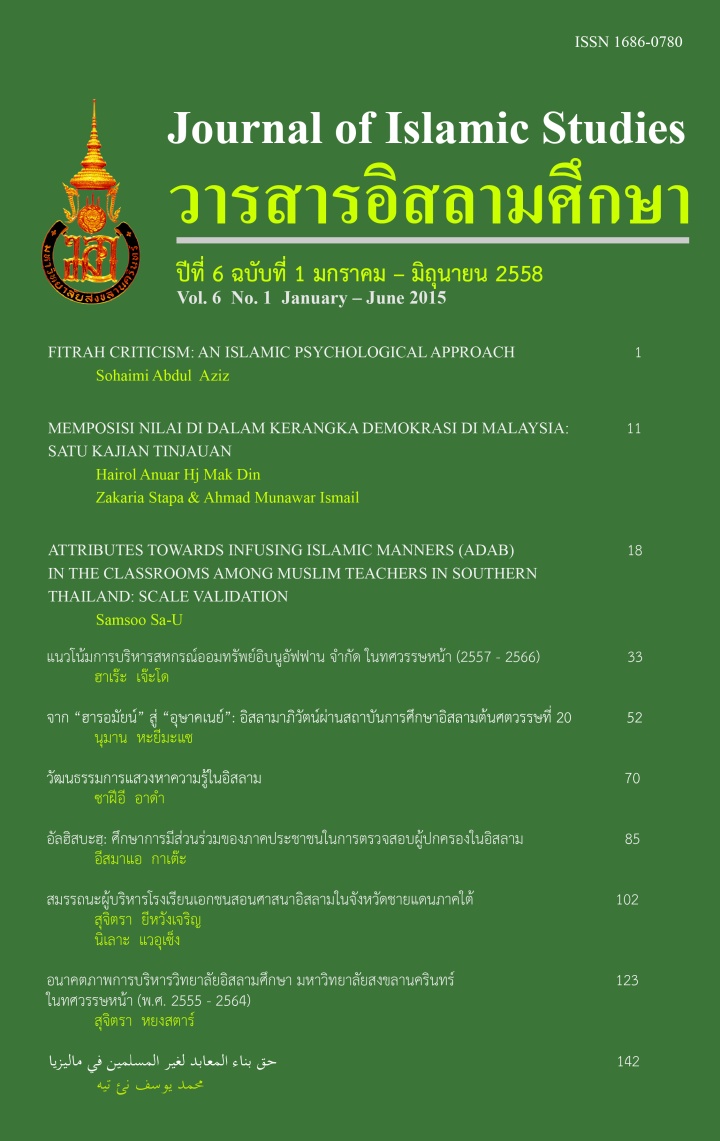The Scenario of Administration of College of Islamic Studies, Prince of Songkla University, during the Next Decade (2012 - 2021)
Keywords:
Administration, College of Islamic StudiesAbstract
This research aims to examine the scenario of administration of College of Islamic Studies (CIS), Prince of Songkla University (PSU), during the next decade (2012 - 2021) regarding 6 respects, namely 1) graduate production, 2) research, 3) academic services for community, 4) art and cultural preservation, 5) development of students and students’ affairs, and 6) administration and management. The study adopted the Ethnographic Delphi Futures Research (EDFR) technique relying on the open-ended interview of 17 experts for the first round. The data was then content analyzed and synthesized to form a 5 Likert Scale Question of Naire to be used for a second and third round. The statistics used in analyzing the data are percentage, medium, mode, and interquartile.
The finding revealed the scenario of administration of CIS, PSU, during the next decade (2012 - 2021) regarding 6 respects as follows:
- Regarding graduate production, there should be more promotion and development of the graduates with relation to public mind awareness, good human relation, social responsibility, leadership, and being good model and capable of living and working with others in multi-cultural society.
- Regarding research area, it should be conducted to create new body of knowledge which can be directly utilized in national development such as the integrated curriculum of Islamic sciences, Islamic businesses, Islam and technology, etc.
- Regarding academic services for community, the outcomes of academic services for community should be brought back, reviewed and adapted for developing learning and teaching methods, research, and planning clear strategy of the future academic services. That could be done by locating the strong and weak points of the community and surveying its necessity in order to plan its development accordingly. There should be also the enhancement of the academic services to reach a variety of targeted groups. CIS must function as source of Islamic data and information in all fields, and similarly as center of Islamic education for community and promotion and improvement of learning and teaching of Pondok institute in line with the recognized standard.
- Regarding art and cultural development, there should be researches conducted in art and cultural fields whose output could lead to social development in conformity with Islamic principles such as the researches on culture of cooperation in maintaining occupations and religious practices on various important occasions, etc.
- Regarding development of students and students’ affairs, there should be library improvement, computer compartment, learning tools, and activities which help improve the students’ potential and skill in academic, linguistic, and technological performance and utilization while urging and supporting them to conduct higher education. CIS should also design students’ activities to improve their capability which suits the modern society by strengthening their knowledge, leadership, public mind, and character which reflects the identity of the College, particularly being pious Muslim, adopting Islamic culture of dressing, and maintaining Islamic ethical life in Thai Society. In addition, there should be promotion and support of the traditional way of learning (Halaqah) for all the personnel in the College so as to develop their moral, ethical and learning life, and life maintenance. The students should be trained to be what is universally required by Islam, brave, confident, and able to get on with all other religious members of the society.
- Regarding administration and management, there should be adoption of educational quality control system in the College as a tool for more serious and earnest administration and management, emphasis on Islamic ethics and morality as way of life, and good governance in overseeing the organization, promotion of saving energy and other resources to reduce expenditure, emphasis on correctness, appropriateness, proficiency, transparency, and accountability. The improvement and revision of educational curriculum of each program to respond to the need of time and initiation of new curriculum to meet the need of society, the training of administrators, lecturers, and other personnel to live up to religious values be honest, ethical, responsible, cooperative and devoted to make the College achieve its expected goals, should be realized and carried out urgently, too.
References
นิเลาะ แวอุเซ็ง. 2540. แนวโน้มการบริหารของวิทยาลัยอิสลามศึกษา มหาวิทยาลัยสงขลานครินทร์ ในทศวรรษหน้า (พ.ศ. 2540 – 2549). วิทยานิพนธ์ศึกษาศาสตรมหาบัณฑิต สาขาวิชาการบริหารการศึกษา มหาวิทยาลัยสงขลานครินทร์. (สำเนา)
ภัทรธิรา ผลงาม. 2552 . อนาคตภาพของมหาวิทยาลัยราชภัฏเลยในทศวรรษหน้า (พ.ศ. 2552 – 2562) คณะมนุษยศาสตร์และสังคมศาสตร์ มหาวิทยาลัยราชภัฏเลย. (สำเนา)
ภาวิช ทองโรจน์ . ม.ป.ป.สภาสถาบันอุดมศึกษากับการพัฒนาอุดมศึกษา (ออนไลน์). สืบค้นจาก: www.dusit.ac.th/course/standard/No-3. pdf 12 กุมภาพันธ์ 2556.
วิทยาลัยอิสลามศึกษา. 2553. รายงานประจำปีการประเมินคุณภาพการศึกษา ประจำปีการศึกษาและปีงบประมาณ 2552.
สุบรรณ เอี่ยมวิจารณ์. 2550. อนาคตภาพที่เป็นไปได้ของมหาวิทยาลัยมหาสารคามในทศวรรษหน้า วิทยานิพนธ์ปริญญาศึกษาศาสตรดุษฎีบัณฑิต มหาวิทยาลัยขอนแก่น. (สำเนา)
สำนักงานคณะกรรมการการศึกษาแห่งชาติ. 2542. แนวทางการปฏิรูปการศึกษาระดับอุดมศึกษาตามพระราชบัญญัติการศึกษาแห่งชาติ พ.ศ. 2542. (สำเนา)
สำนักงานคณะกรรมการอุดมศึกษา. กระทรวงศึกษาธิการ. 2550. กรอบแผนอุดมศึกษาระยะยาว 15 ปี ฉบับที่ 2 (พ.ศ. 2551-2565). (สำเนา)
สำนักงานคณะกรรมการอุดมศึกษา. คู่มือการประกันคุณภาพการศึกษาภายในสถานศึกษา ระดับอุดมศึกษา พ.ศ. 2553. กรุงเทพฯ : ห้างหุ้นส่วนจำกัดภาพพิมพ์.
อะหฺมัด อิบรอฮีม อบูซิน 2553. การบริหารจัดการในอิสลาม . แปลจาก Islamic Management . โดย ฮาเร๊ะ เจ๊ะโด. สงขลา : ไอคิว มีเดีย.
Ali Mohammad Jubran Saleh.2551. การบริหารการศึกษาในอิสลาม. แปลจาก Education Administration: An Islamic Perspectives โดย นิเลาะ แวอุเซ็ง. ปัตตานี : วิทยาลัยอิสลามศึกษา มหาวิทยาลัยสงขลานครินทร์ วิทยาเขตปัตตานี.
Downloads
Published
How to Cite
Issue
Section
License
Copyright (c) 2015 Journal of Islamic Studies, Prince of Songkla University, Pattani Campus

This work is licensed under a Creative Commons Attribution 4.0 International License.
All articles Published in The Journal of Islamic Studies are author’s opinions, and not the responsibility of the Faculty of Islamic Sciences nor the editorial board. However any citation should be referred to the journal.
















